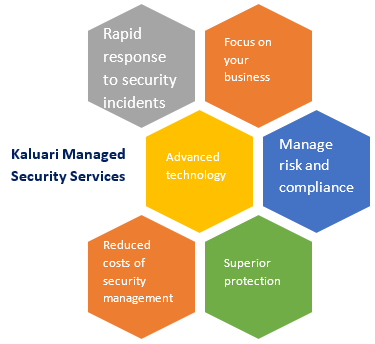• We have various tools to automate these processes, therefore, we divert the burden of performing the chores manually, which can be considerable, away from your IT administrators.
• You receive day-to-day monitoring and interpretation of important system events throughout the network – including unauthorized behavior, malicious hacks, denial of service (DoS), anomalies and trend analysis.
• It can add rare, specialized cybersecurity skills to your team, such as cloud security, identity or compliance knowledge, without the need to build your own expensive security operations center.
• It can help prevent system breaches through automated incident response, removing complexity in security, reducing alert fatigue for in-house staff, and provide proper compliance governance.
• Alleviate the pressure businesses face daily to information security such as targeted malware, customer data theft, skills shortages and resource constraints.
• By monitoring your network, we can help your organization improve its visibility and context into the overall security program and reduce risk from misconfigured cloud resources.

